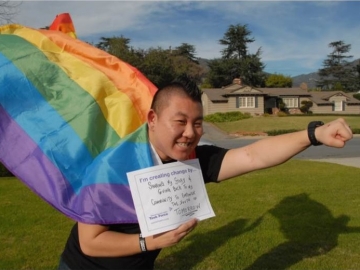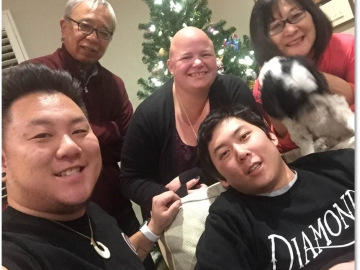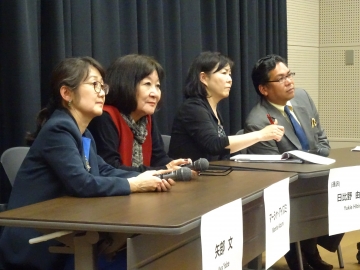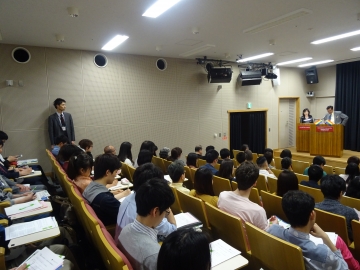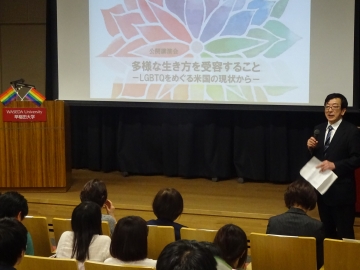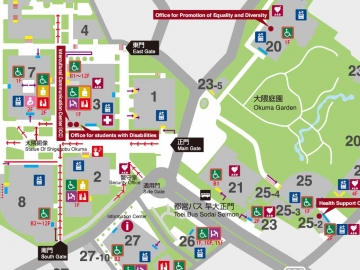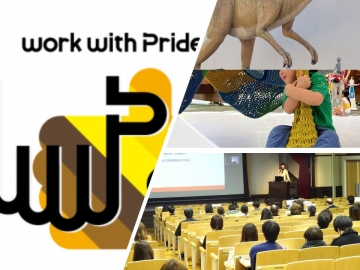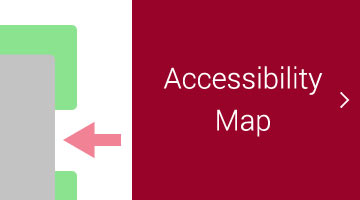Event Report
On April 18, 2017, a public lecture entitled “Accepting Diversity of People – A Look at the Current State of LGBTQ Acceptance in America –” was presented at the Okuma Memorial Tower. A receptive audience of 88 people was on hand to listen to the speakers discuss the current state of LGBTQ acceptance in America, their own experiences as members of the LGBTQ community, the stories of families accepting loved ones as LGBTQ as well as to hear a message from the speakers to society.
Content
- Opening Remarks
Tetsuya Yaguchi
Director of the Office for Promotion of Equality and Diversity(Professor, Faculty of Education and Integrated Arts and Sciences) - Speaker
“Current State of LGBTQ Acceptance in America” [Consecutive interpretation: Yukie Hibino]
Glenn D. Magpantay, Esquire
“Conflict as a Parent and the Outlook for the Future” [Consecutive interpretation: Yukie Hibino]
Marsha Aizumi
“What We Can All Do to Create a Truly Inclusive Society”
Aya Yabe - Question and Answer
———————————————-
The event opened with some remarks by Tetsuya Yaguchi, Director of the Office for Promotion of Equality and Diversity. “Waseda University brings together a diverse array of people, which I see this as being one of its defining characteristics. In April, we opened the Student Diversity Center. Diversity includes not only nationality, race, physical ability and culture but also sexual diversity, and Waseda University is taking small but definite steps towards being more inclusive of sexual diversity. Today’s event represents such as a step, as it offers those of you attending an opportunity to learn about the state of LGBTQ acceptance in America, as well as to hear firsthand about relationship-building between those in the LGBTQ community, their families and those around them.” Yaguchi then thanked the speakers Mr. Magpantay and Ms. Aizumi as well as Waseda University New York Alumni Association Vice President Aya Yabe, who helped make it possible to hold this event at Waseda.
Ms. Yabe spoke next, explaining that this event is part of the “Family Acceptance of LGBT Children” campaign being sponsored by the National Queer Asian Pacific Islander Alliance (“NQAPIA”) and that, given the difficulties that members of the LGBTQ community still face in America, there exists a keenly felt need for cooperation across national and cultural borders. Ms. Yabe was then followed by the event speakers.
Address #1: “The Current State of LGBTQ Acceptance in America” – Glenn D. Magpantay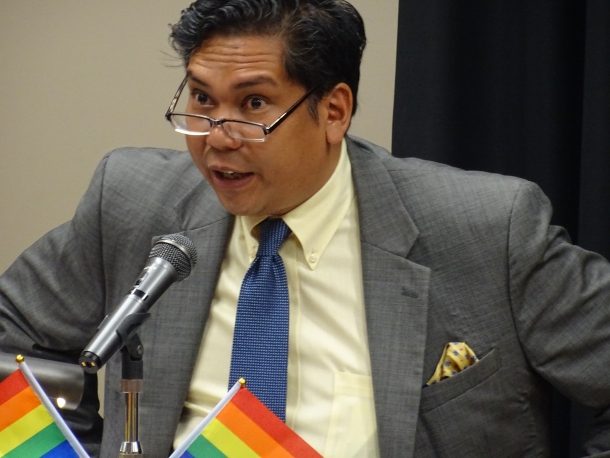
The first speaker was NQAPIA Executive Director, Mr. Glenn D. Magpantay, whose address topic was the current state of LGBTQ acceptance in America. Mr. Magpantay began by introducing NQAPIA and its activities, discussing the intersection of immigration and queer (a collective term for all sexual minorities) rights, as well as talking about the visibility of members of the LGBTQ community.
Asian-Americans are a rapidly growing yet still socially marginalized demographic, and was founded with the purpose of improving the situation faced by Asian-Americans who find themselves isolate NQAPIA d after coming out as LGBTQ. NQAPIA is a federation of 47 different organizations which works together with local Asian LGBT groups to promote greater inclusiveness. Leaders from all member groups come together for annual meetings, as well as for a triennial NQAPIA National Conference (the next conference is scheduled for summer 2018 in San Francisco), to which numerous overseas guests are invited.
Mr. Magpantay then turned to the topic of queer and immigrant rights, providing the audience with his perspective on the current state of affairs in America.The United States eliminated the last legal barriers to citizenship for Asians roughly 50 years ago; however, Asian-Americans still frequently experience prejudice and discrimination based on their racial or queer identity. For example, “Married (same-sex marriage) on Sunday. Fired on Monday,” is a form of discrimination faced by members of the gay community in several states, while transgender women of color face the very real threat of murder. In order to help ensure that members of the immigrant and LGBTQ communities can exercise their rights fairly without fear of prejudice or death, NQAPIA believes it is essential that these communities become organized and work together. As a gay American himself, Mr. Magpantay feels that queer and immigrant rights share much in common and that there is still much to fight for in order to achieve justice for both.
When he came out as a 17 year-old in the 1980s, Mr. Magpantay had no one to turn to for support, but much has changed since then, with Asian members of the LGBTQ community now able to work, marry, have children and pursue life to its fullest. Nevertheless, despite all of this, a great many challenges remain. Mr. Magpantay expressed his desire to continue helping Asian members of the LGBTQ community achieve more widespread visibility within it, and he spoke of the pride he feels serving in his current position and of his commitment to providing members with the support they need to achieve their dreams. Mr. Magpantay concluded by encouraging those in attendance to play a helping hand in realizing the goals of NQAPIA.
Address #2 “Conflict as a Parent and the Outlook for the Future” – Marsha Aizumi
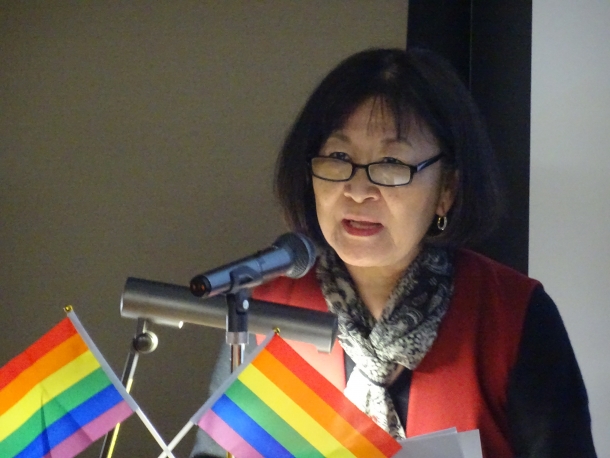 The next speaker was Ms. Marsha Aizumi, one of the National Directors for PFLAG (a United States-based organization for parents and allies of LGBT people), who spoke from her own personal experience about the conflicts a parent of an LGBT child goes through as well as the lessons she has learned from her family. Ms. Aizumi opened her address by remarking how surprised she was to find a “multipurpose restroom” at Waseda University and commented that this conveyed a sense of welcoming and safety to members of the LGBTQ community.
The next speaker was Ms. Marsha Aizumi, one of the National Directors for PFLAG (a United States-based organization for parents and allies of LGBT people), who spoke from her own personal experience about the conflicts a parent of an LGBT child goes through as well as the lessons she has learned from her family. Ms. Aizumi opened her address by remarking how surprised she was to find a “multipurpose restroom” at Waseda University and commented that this conveyed a sense of welcoming and safety to members of the LGBTQ community.
Ms. Aizumi’s adopted daughter, born in Japan in 1988, hated dresses and dolls since she was 2 or 3 years old. She was extremely sociable, energetic and popular during her elementary school years, but starting in junior high school she became progressively isolated and withdrawn. This situation got even worse in high school, where bullying after her coming out as lesbian caused her to withdraw even more and to have suicidal thoughts. Eventually she was unable to even attend school and was only barely able to graduate. Five years later she came out as transgender and transitioned from being a daughter to a son. On his 21st birthday, Ms. Aizumi’s son said to her, “I didn’t think I’d live to see this day. I figured either someone would have killed me, or I would have killed myself.” On that day they both celebrated his determination to “keep living.”
Ms. Aizumi’s son now has a job, is married and is living a life filled with hope, but – she told the audience – she felt tremendous conflict when her son told her that he was transgender. She felt guilt and shame, as if she were a bad mother who had caused her son to be this way, and she felt fear at the prejudice that her son would have to overcome. From grappling with all of this, she learned several lessons which she shared with the audience:
- “I cannot choose my son, but I do have a choice to make”I found courage from directly confronting the “why?” inside me
- Knowledge helps overcome fear
- Support helps free you from a sense of isolation
- To truly connect emotionally, you need to communicate and be willing to forgive
Ms. Aizumi also shared the following heartwarming story with the audience.
“Whenever I tell my son, ‘I love you,’ he will always reply, ‘I love you more.’ Once, I said to him first, ‘I love you more, honey,’ but with love brimming in his eyes, he immediately replied, ‘That’s impossible, Mama.’”
Ms. Aizumi implored the audience, if anyone has a transgender child, make sure to spend time with them. She also implored anyone who might be thinking of coming out to their parents to make sure and provide them with helpful information and resources. With great passion in her voice, she told the audience that building good relationships with your family depends upon you.
- My son Aiden and his other shadow. This picture symbolizes my desire to support my son.
- Family photo of my son Aiden with his younger brother, wife, dog (“Bear”) and my husband.
Address #3 “What We Can All Do to Create a Truly Inclusive Society” – Aya Yabe
The final address was given by Ms. Aya Yabe, Waseda University New York Alumni Association Vice President and an active member in the New York chapter of PFLAG. Using her own family’s experiences as an illustration, she made an impassioned appeal for the creation of a society where everyone feels welcome and accepted.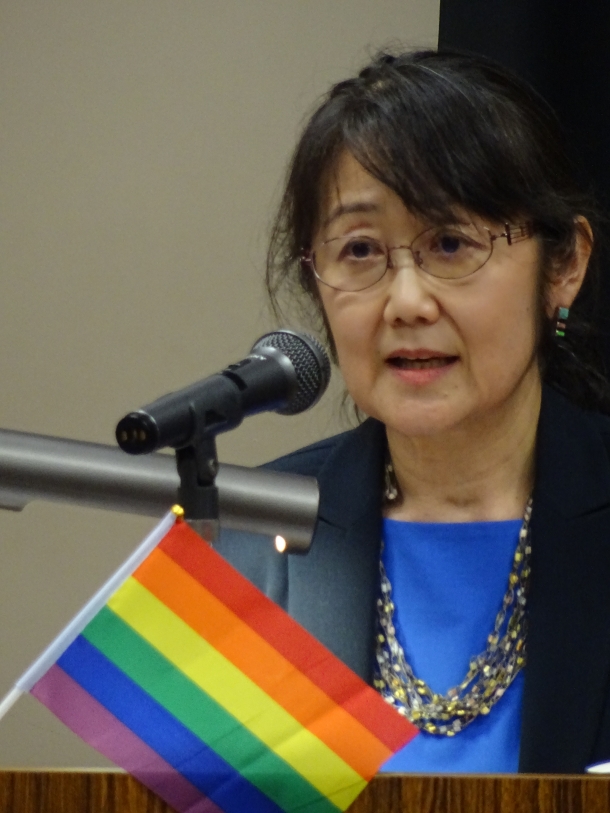
At the age of 21, Ms. Yabe’s daughter came out as a lesbian. She loved and supported her daughter regardless of whether she was gay or straight, so she felt a tremendous fury at the reaction of those around her when her daughter came out publicly by announcing her engagement. Given the fact that her daughter had told her of how long it had taken for her to accept her own sexuality, how she felt unable to even hold her fiancée’s hand in public in, supposedly, LGBTQ-friendly New York, Ms. Yabe felt as if she needed to apologize for being part of a society that fostered heteronormative thinking.
“What would your reaction be to finding out one of your friends or family members is LGBTQ?”
After throwing this question to the audience, Ms. Yabe offered her own thoughts on handling such situations.
- Your reaction will vary greatly depending on how informed you are about LGBTQ issues
- As a Japanese, heterosexual and/or university student, you possess privilege which you can exercise in a way which harms those without such privilege or which provides them with a safe space
- By trying to understand, you show the other person that you respect them
Video
You can watch the video of the lecture from here.

